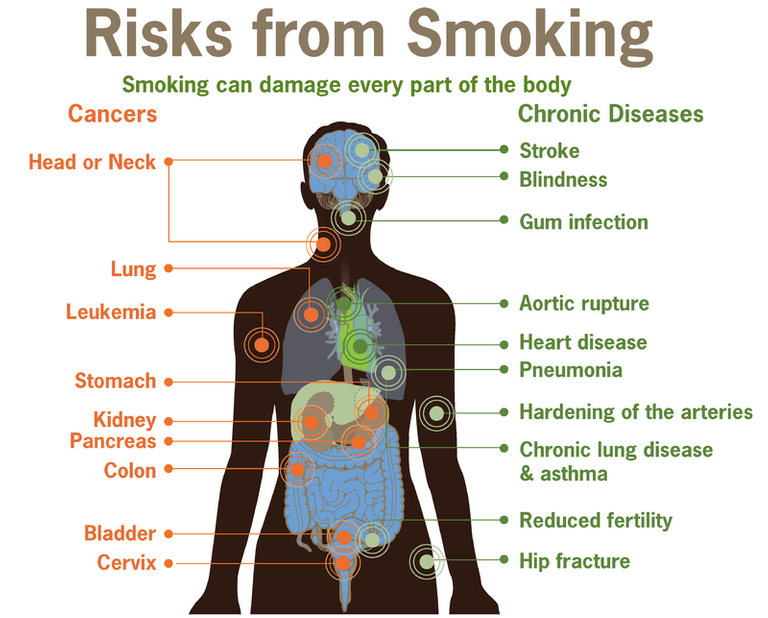How Dangerous is Smoking?

Smoking is a very addicting habit that is very difficult to let go off once begun. And the longer one smokes, the more difficult it gets to quit. Despite multiple warnings about the dangers of smoking and adequate public health information, a 2019 study published on the Lancet showed that the number of smokers worldwide has increased to 1.1 billion in 2019, with tobacco smoking causing 7.7 million deaths – including 1 in 5 deaths in males worldwide.
Smoking is the leading cause of preventable death in the United States, and it also carries a number of health risks. According to the Center for Disease Control and Prevention, cigarette smoking harms almost all organs in the body and causes many diseases, including cancer, heart disease, emphysema, and chronic lung disease. Cigarette smoke contains more than 4,000 chemicals, many of which are poisonous. When inhaled, these chemicals damage cells throughout the body and can cause many of the health problems associated with smoking.
Smoking also increases the risk of death from stroke and heart attack by affecting the body's ability to properly regulate blood pressure, blood clotting, and other important functions. Smoking increases the risk for infertility, pneumonia, and lung infections.

Smoking a single cigarette a day, increases a person's risk of coronary heart disease and stroke by 50%. Researchers have found that people who quit smoking before age 40 reduce their risk of having a heart attack or stroke later in life by up to 90%. And many studies have shown that quitting at any age reduces health risks.
Secondhand Smoke
Exposure to secondhand smoke also increases the risk of many types of cancers, including lung, oral, bladder, stomach, kidney, colorectal, esophageal, and pancreatic.
Thirdhand smoke, also known as environmental tobacco smoke, is the residual smoke that remains on surfaces after a cigarette has been smoked. Thirdhand smoke which is not as dangerous as second hand smoke still poses a potential health hazard to nonsmokers especially those in extreme of ages (young children and the elderly). People get exposed to the chemicals in thirdhand smoke when they touch contaminated surfaces or breathe in the gases that thirdhand smoke may release.
Are e-Cigarettes any Safer?
A growing body of evidence supports the idea that e-cigarettes are safer than regular cigarettes. However, there is still some evidence that they may increase risk of heart attacks. For this reason, current health recommendations urge people to continue to avoid both conventional and electronic cigarettes. In addition, these products should be regulated as tobacco because of their inherent health risks.
Current research suggests that e-cigarette use by teenagers is especially dangerous because these young smokers may use e-cigarettes to help them quit smoking cigarettes but end up with an increased number of tobacco-related health problems.
Most leading electronic cigarette companies insist that they are not targeting young people as customers. However, studies have shown that nearly 70% of people who use e-cigarettes started using them while they were still in high school. This is alarming because e-cigarettes have become popular among young people because they can be easily obtained. Many stores that sell traditional tobacco products also sell e-cigarettes because they are making large profits by selling the same products to customers who are addicted to nicotine. This makes it very easy for teenagers to buy these products without their parents knowing.
JUUL, a popular vape device that comes in fun flavors, looks like a flash drive and can be charged in a USB port is available for sale in most retail stores.

Like, comment, share


Thanks for your contribution to the STEMsocial community. Feel free to join us on discord to get to know the rest of us!
Please consider delegating to the @stemsocial account (85% of the curation rewards are returned).
You may also include @stemsocial as a beneficiary of the rewards of this post to get a stronger support.